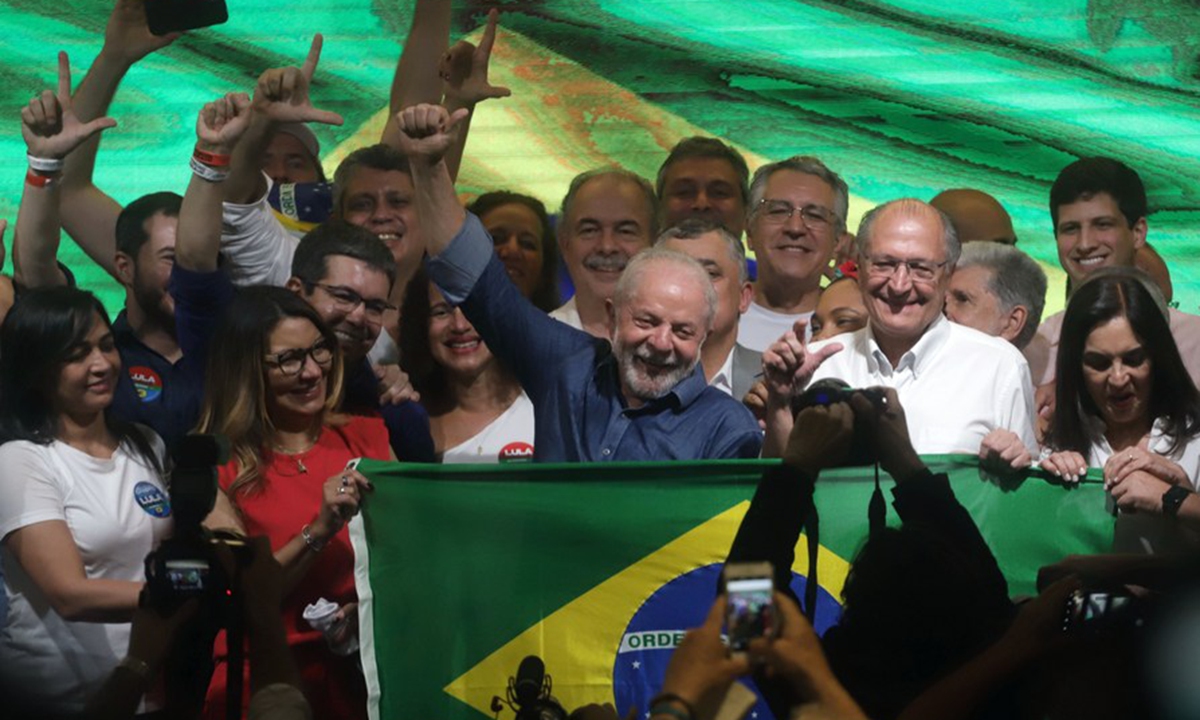|
Luiz Inacio Lula da Silva (C, front) attends a celebration event in Sao Paulo, Brazil, on Oct. 30, 2022.Photo: Xinhua The ballotage(second round election) in Brazil on October 30 was described as "the mother of all elections." Incumbent president Jair Bolsonaro faced former president Luiz Inacio Lula da Silva in a no-holds-barred contest. Bolsonaro, often referred to as "the Trump of the Tropics," hails from the extreme right, whereas Lula, a metal worker turned trade union leader, who lost a finger on the factory floor, and for whom this was his sixth presidential election, is an icon of the Left. In a Brazil that is going through a bad patch, with a sputtering economy and one of the highest fatality rates from the COVID-19 pandemic (nearly 700,000 Brazilians lost their lives in it), the eight years of Lula's two terms (2003-2010) are regarded as a "golden era." Economic growth, ambitious social programs that lifted 40 million people from poverty, strong international presence (with Brazil winning the bids for hosting both the FIFA World Cup and the Olympic Games), and guardrails to protect the Amazon, were the hallmarks of a period that seemed to have put paid to the old saying, "Brazil is the country of the future, and always will be" (though it didn't). Lula was described as the most popular politician on Earth (Obama described him as "The Man"), and left office with an 87 percent approval rating. Yet, fate takes strange turns, and a few years later, with questionable evidence and procedures, a politically ambitious prosecutor had Lula indicted and convicted on corruption charges. The Brazilian Supreme Court quashed the conviction because of these irregularities, and Lula was freed after serving 18 months. At 77 years of age, and after what he had been through, many would have understood if Lula had retreated to the role of elder statesman. Yet, that is not his style, and he went back straight into the political arena to fight for what he believes in. In so doing, and in contrast to the "divide and rule" tactics of his adversary, Lula built a broad coalition across the political spectrum, that would be key to his (narrow) victory on October 30, where he got 50.9 percent of the vote. His candidate for vice-president was Geraldo Alckmin, of the PSDB, a former governor of Sao Paulo, who had run against Lula in the 2006 presidential elections. Former president Fernando Henrique Cardoso (1994-2002), with whom Lula had strong differences in the past, supported Lula as well, as did the presidential candidates that did not make it to the second round, like Simone Tebet and Ciro Gomes, allowing Lula to come out ahead in the ballotage. For the first time since Brazil's return to democracy, an incumbent president was defeated in an election for a second term. Yet, Lula now has an uphill task. His party, the PT (Workers' Party) does not have a majority in Parliament, and, much as he did in his previous terms in Planalto (Brazil's presidential palace in Brasilia), he will have to work with the Center parties that hold 28 percent of the seats in the Lower House, and 42 percent in the Senate. A key demand of the Brazilian public is an upgrading of public services, which will mean higher spending in a country already facing a high fiscal deficit, low economic growth and stagnant productivity. On foreign policy, it is expected that Brazil will once again play a leading role in strengthening South American regional cooperation and coordination (in contrast to Bolsonaro, who quit the Community of Latin American and Caribbean States, Latin America's umbrella regional organization, as one of the first things he did), as well as to reclaim a pivotal position in the Global South through entities like the BRICS. Relations with China are expected to resume a steady course - Brazil-China trade reached $164 billion in 2021, about one third of all Sino-LAC trade, and Brazil has received half of Chinese FDI in Latin America, of about $140 billion. Brazil should also improve ties with the United States, which reached rock bottom under Lula's predecessor. Brazil is well positioned to play a key role in today's turbulent world. A key country of the Global South, yet part of the Western Hemisphere, with a significant population of African descent, it embodies the diversity and heterogeneity that marks our era. It can be a hinge between North and South, East and West, in a way few other countries can. President-elect Lula has the chance to restore Brazil's rightful place in world affairs as well as to unite a deeply divided nation. It will not be an easy task, and the world will be watching. The author is a research professor at the Pardee School of Global Studies, Boston University, a Wilson Center global fellow, and a senior research fellow at the Center for China and Globalization (CCG). [email protected] (责任编辑:) |

